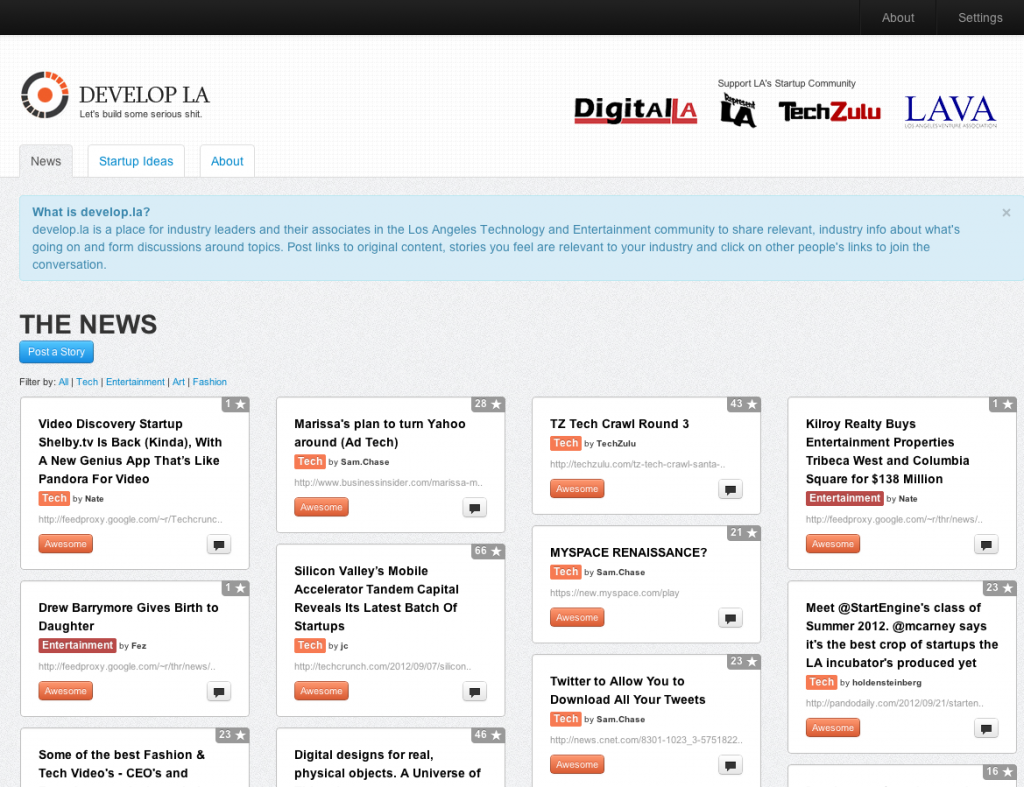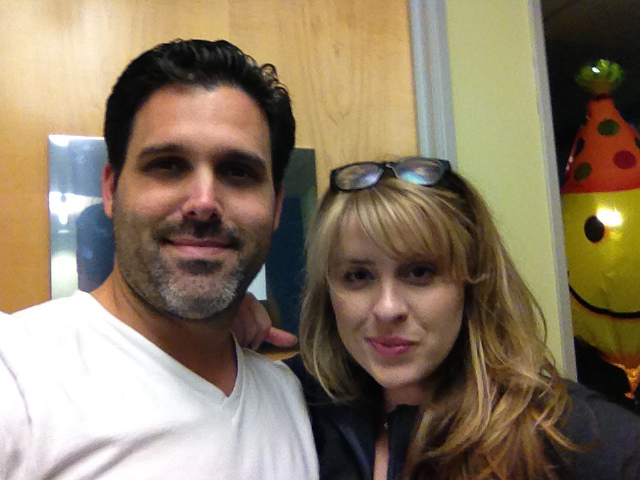Develop.la | L.A.’s Own Hacker News and Why Now?
 I recently had the pleasure of interviewing engineer and PageWoo’s CEO and co-Founder Jason Crilly about his side project, the new hacker news site for the Southern California tech community called Develop.la.
I recently had the pleasure of interviewing engineer and PageWoo’s CEO and co-Founder Jason Crilly about his side project, the new hacker news site for the Southern California tech community called Develop.la.
First off, there are a few things about Jason you should know. Jason is a passionate advocate for
the rising tech movement sweeping through the burgeoning Los Angeles startup scene — he wants to put L.A. tech on the map and he is behind it “120%.” He recently produced the Silicon Beach Fest along with Kevin Winston of Digital LA, and his mobile ad optimization and re-engagement company PageWoo came out of the 1st graduating class for the new Los Angeles accelerator Start Engine (developed by serial entrepreneur of Activision fame, Howard Marks). Jason is very involved in the local tech community and he has a vision he wants to share with all of you. A vision of the future of the Los Angeles tech community he hopes will rival — if not surpass Silicon Valley in 10 years as a the leader of groundbreaking innovation. The road to get there, as he sees it, is through collaboration and exploration. Creating L.A.’s own hacker news, Develop.la is a step in that direction.

Inspired by Silicon Valley’s ability to focus and tweak ideas into new technology, Crilly came up with Develop.la. At PageWoo, they follow Google’s 20% free time rule to conceive new products, with that time Crilly made Develop.la modeled after Silicon Valley’s Hacker News with hopes of inspiring the Los Angeles developer community to work together, brainstorm, solve problems and simply “build some serious shit together.”
“Hacker News in Silicon Valley is run by Paul Graham of Y Combinator, and they have been killing it for years. One of the reasons is they have this great community forum,” said Crilly. “Paul does this cool thing where he puts up ideas he wants to see startups do and apply to Y Combinator with. We want to do something in the same vein and see what kind of awesome ideas can come out of L.A.,” said Crilly.
 Crilly is ready to rally the troops (the L.A. innovators of the future) into figuring out what should be built and how to build it in a community forum that is structured and allows for the best ideas to be voted to the top ala Digg or Reddit. On the Develop.la site, the News section is broken into the top business sectors of Los Angeles that are poised for disruption including Technology, Entertainment, Fashion and Art. Last week he turned on the Ideas tab where he hopes developers and builders will help determine and share knowledge on how to turn the best ideas into reality. Crilly maintains that L.A. is where the world’s top storytellers and content creators live, so naturally their expertise will shape future technology innovations. It’s inevitable. Sort of.
Crilly is ready to rally the troops (the L.A. innovators of the future) into figuring out what should be built and how to build it in a community forum that is structured and allows for the best ideas to be voted to the top ala Digg or Reddit. On the Develop.la site, the News section is broken into the top business sectors of Los Angeles that are poised for disruption including Technology, Entertainment, Fashion and Art. Last week he turned on the Ideas tab where he hopes developers and builders will help determine and share knowledge on how to turn the best ideas into reality. Crilly maintains that L.A. is where the world’s top storytellers and content creators live, so naturally their expertise will shape future technology innovations. It’s inevitable. Sort of.
Now this all sounds super awesome and inspiring right? But I throw out to him the catch. And the catch is that many people of varied backgrounds have amazing and innovative ideas that could possibly be game-changers, but they are not engineers or developers, and if all they have is a great idea they cannot build themselves, they might not be inclined to share it. Hollywood is built on ideas and lawsuits. So is tech. Public wars between Apple and Samsung, Zuckerberg and the Winklevoss twins reinforce the theory that owning the idea is what matters. Crilly agreed that L.A. was a little closed off in this area because many believe their idea is the big win. But ideas do not build themselves.
“That’s the funny thing. People who do not know how to build something are really scared of someone taking their idea and running with it,” says Crilly. “The truth is you can go to any college campus in America, and VC meeting or tech conference and shout out your idea and no one will notice because they are focused on their ideas.” Crilly contends there are no ideas that haven’t been thought of already by someone somewhere. One of his goals is to change this attitude toward hoarding good ideas that never see the light of day.
Crilly said if you look at FriendFeed and Twitter, and like, the 7 different companies that came up with that same exact idea at the same time, the winner was the one that succeeded in getting the most users to adopt their technology first, Twitter.
“We cannot do it on our own. Lonely dude on a pedestal is not going to get $100m exit, it just won’t happen. We all need to work together to lift our sails, or we won’t be the next Silicon Valley, we won’t be anything,” said Crilly. “We get distracted too easily in L.A. sometimes.”
Crilly sees some things that need to happen before L.A. can stretch its wings and claim itself a true rival to Silicon Valley. It needs a few key resources; like more major funding and angel investors, more huge $100m exits with startup winners that reinvest in new local startups, and investors that actually know and understand technology.
“One of the great things that happens in the Valley is that if you have a great idea, you can take it to Andreessen Horowitz or Sean Parker or anyone that is notable up there. They will make a decision on the spot if they think is it a good idea, because they know how to evaluate it,” said Crilly. Whereas that doesn’t happen in L.A. Technology companies get funded here without the investors knowing too much. It is not for lack of startups telling the investors what they are doing, but through the fact the investors just do not have the (technology) knowledge. We don’t have that kind of braintrust here in L.A. yet.” said Crilly.
Crilly thinks it is coming. Overall, Crilly knows it might take a little more time for L.A. to be a serious contender to Silicon Valley, but the call has gone out, and the community has adopted the name “Silicon Beach” —and smart people like himself are on board to unite the winners. His latest contribution to the future success of the city is through L.A.’s first hacker news site, Develop.la. Check it out, and start building.








